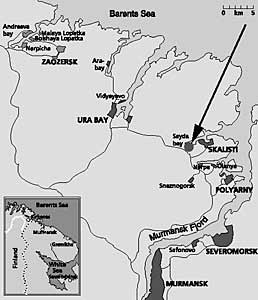
Norway’s environmental prosecutor fines Equinor a record amount following Bellona complaint
Økokrim, Norway’s authority for investigating and prosecuting economic and environmental crime, has imposed a record fine on Equinor following a comp...
News

Publish date: March 27, 2000
Written by: Thomas Nilsen
News
For the inhabitants of Gadzhievo, a remote naval base city at the Kola Peninsula, only one question would have been of more importance than the name of the next Russian president on Sunday. A proposed onshore storage site for reactor sections in Sayda Bay – just over the hill from their neighbourhood – was of a bigger concern. The plan has met tremendous local protests led by the city council. The outcome was a proposal filed on January 21 to put this issue on local referendum at the day of the presidential elections in Russia. The question to answer sounded scary: "Do you want nuclear-hazardous items stored in you neighbourhood?" The City Court of Gadzhievo, however, overruled the decision on March 23.
"The city council decided to obey the decision and not to arrange referendum this time," said Vladimir Musakyan, the chairman of the local city council, to Bellona Web. "We are going to evaluate now our position and decide what we shall do next," Musakyan added.
The administration of the Murmansk County was sceptical to the whole idea of referenda when reached by Bellona, saying that it would have no effect on the eventual decision regarding the location of the storage site. The finally outlined proposal for the storage location is said to come shortly.
Chain reaction of protest
Økokrim, Norway’s authority for investigating and prosecuting economic and environmental crime, has imposed a record fine on Equinor following a comp...

Our op-ed originally appeared in The Moscow Times. For more than three decades, Russia has been burdened with the remains of the Soviet ...

The United Nation’s COP30 global climate negotiations in Belém, Brazil ended this weekend with a watered-down resolution that failed to halt deforest...

For more than a week now — beginning September 23 — the Zaporizhzhia Nuclear Power Plant (ZNPP) has remained disconnected from Ukraine’s national pow...